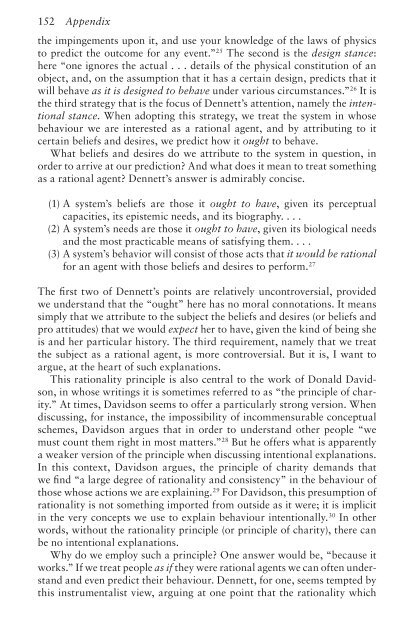Theism and Explanation - Appeared-to-Blogly
Theism and Explanation - Appeared-to-Blogly
Theism and Explanation - Appeared-to-Blogly
You also want an ePaper? Increase the reach of your titles
YUMPU automatically turns print PDFs into web optimized ePapers that Google loves.
152 Appendix<br />
the impingements upon it, <strong>and</strong> use your knowledge of the laws of physics<br />
<strong>to</strong> predict the outcome for any event.” 25 The second is the design stance:<br />
here “one ignores the actual . . . details of the physical constitution of an<br />
object, <strong>and</strong>, on the assumption that it has a certain design, predicts that it<br />
will behave as it is designed <strong>to</strong> behave under various circumstances.” 26 It is<br />
the third strategy that is the focus of Dennett’s attention, namely the intentional<br />
stance. When adopting this strategy, we treat the system in whose<br />
behaviour we are interested as a rational agent, <strong>and</strong> by attributing <strong>to</strong> it<br />
certain beliefs <strong>and</strong> desires, we predict how it ought <strong>to</strong> behave.<br />
What beliefs <strong>and</strong> desires do we attribute <strong>to</strong> the system in question, in<br />
order <strong>to</strong> arrive at our prediction? And what does it mean <strong>to</strong> treat something<br />
as a rational agent? Dennett’s answer is admirably concise.<br />
(1) A system’s beliefs are those it ought <strong>to</strong> have, given its perceptual<br />
capacities, its epistemic needs, <strong>and</strong> its biography. . . .<br />
(2) A system’s needs are those it ought <strong>to</strong> have, given its biological needs<br />
<strong>and</strong> the most practicable means of satisfying them. . . .<br />
(3) A system’s behavior will consist of those acts that it would be rational<br />
for an agent with those beliefs <strong>and</strong> desires <strong>to</strong> perform. 27<br />
The fi rst two of Dennett’s points are relatively uncontroversial, provided<br />
we underst<strong>and</strong> that the “ought” here has no moral connotations. It means<br />
simply that we attribute <strong>to</strong> the subject the beliefs <strong>and</strong> desires (or beliefs <strong>and</strong><br />
pro attitudes) that we would expect her <strong>to</strong> have, given the kind of being she<br />
is <strong>and</strong> her particular his<strong>to</strong>ry. The third requirement, namely that we treat<br />
the subject as a rational agent, is more controversial. But it is, I want <strong>to</strong><br />
argue, at the heart of such explanations.<br />
This rationality principle is also central <strong>to</strong> the work of Donald Davidson,<br />
in whose writings it is sometimes referred <strong>to</strong> as “the principle of charity.”<br />
At times, Davidson seems <strong>to</strong> offer a particularly strong version. When<br />
discussing, for instance, the impossibility of incommensurable conceptual<br />
schemes, Davidson argues that in order <strong>to</strong> underst<strong>and</strong> other people “we<br />
must count them right in most matters.” 28 But he offers what is apparently<br />
a weaker version of the principle when discussing intentional explanations.<br />
In this context, Davidson argues, the principle of charity dem<strong>and</strong>s that<br />
we fi nd “a large degree of rationality <strong>and</strong> consistency” in the behaviour of<br />
those whose actions we are explaining. 29 For Davidson, this presumption of<br />
rationality is not something imported from outside as it were; it is implicit<br />
in the very concepts we use <strong>to</strong> explain behaviour intentionally. 30 In other<br />
words, without the rationality principle (or principle of charity), there can<br />
be no intentional explanations.<br />
Why do we employ such a principle? One answer would be, “because it<br />
works.” If we treat people as if they were rational agents we can often underst<strong>and</strong><br />
<strong>and</strong> even predict their behaviour. Dennett, for one, seems tempted by<br />
this instrumentalist view, arguing at one point that the rationality which



